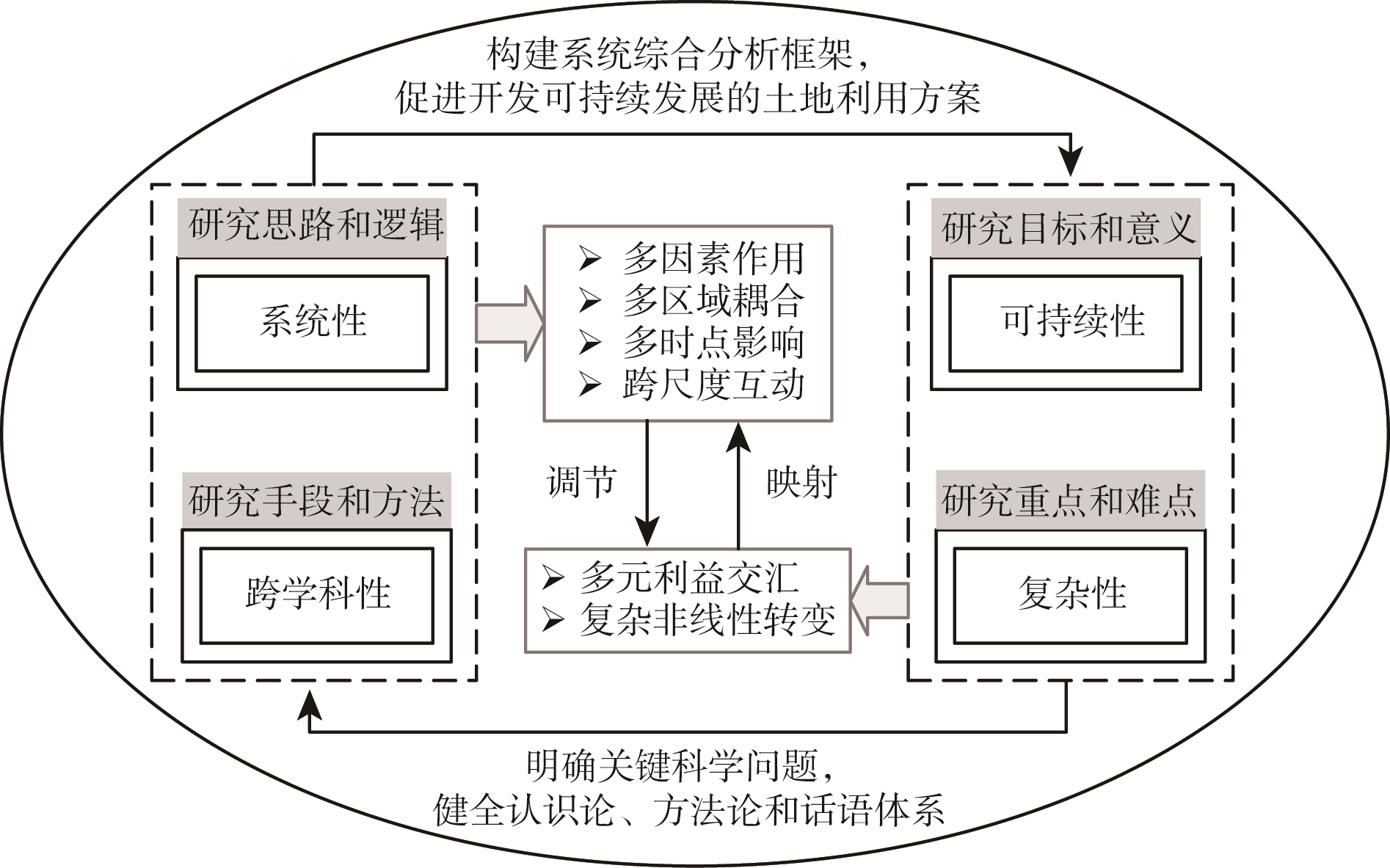

食物安全目标下土地系统科学研究进展与启示
|
梁雅嘉(1998- ),女,湖南涟源人,博士研究生,研究方向为土地利用、食物地理与城乡发展。E-mail: lyajia@hnu.edu.cn |
收稿日期: 2024-08-26
修回日期: 2025-01-20
网络出版日期: 2025-06-20
基金资助
国家自然科学基金项目(42201209)
Land system science under the goal of food security: Progress and implications
Received date: 2024-08-26
Revised date: 2025-01-20
Online published: 2025-06-20
土地系统科学致力于解决复杂社会—经济—生态问题并开发可持续土地利用方案。食物是人类社会系统和自然环境系统耦合的重要载体,而食物安全目标既是联合国可持续发展目标的重要组成,也是未来中国农业生产转型与人民生活改善的关键任务。本文基于食物安全目标系统梳理了土地系统科学相关研究议题和重要研究进展。研究表明,由于土地位于社会可持续发展需求的多重利益的交汇点,土地系统的非线性转变和复杂反馈机制使得土地系统科学研究呈现跨学科性、系统性、可持续性和复杂性四大特征。土地系统科学在保障食物安全领域已取得显著成果,涵盖土地利用策略、土地利用转型、土地利用远程耦合机制、土地利用需求预测和土地管理体系优化五个核心研究议题,研究呈现出重视跨时空溢出效应、应用系统性和整体性视角以及凸显可持续发展目标的转型趋势。未来研究应以食物“流空间”与食品价值链为逻辑基础,以系统思维开发可持续土地利用方案,加强土地系统科学在多要素耦合的综合集成研究、多学科交叉融合创新理论成果等方面助力食物安全目标实现。

梁雅嘉 , 陈坤秋 . 食物安全目标下土地系统科学研究进展与启示[J]. 自然资源学报, 2025 , 40(7) : 1743 -1758 . DOI: 10.31497/zrzyxb.20250702
Land system science is dedicated to addressing complex socio-economic and ecological challenges and developing sustainable land use solutions. Food inherently serves as a critical link between human societal systems and natural systems. Ensuring food security is not only a key component of the United Nations Sustainable Development Goals but also a crucial task for China's agricultural production transformation and people's livelihoods improvement. This study systematically analyzes the research topics and key advancements in land system science related to food security goals. The findings reveal that, due to the land's position at the intersection of multiple interests associated with sustainable social development, the non-linear transformations and complex feedback mechanisms within land systems endow land system science with four prominent characteristics: interdisciplinarity, systematicity, sustainability, and complexity. In the realm of food security, land system science has achieved notable successes, encompassing five core research areas: land use strategies, land use transitions, land use telecoupling mechanisms, land use demand modelling, and the optimization of land management systems. These studies present the transformative trend towards emphasizing the significance of cross-spatiotemporal spillover effects, adopting systematic and holistic perspectives, and underscoring the sustainable development goals. Future research should be grounded in the logical foundation of food "flow spaces" and the food value chain, employing systems thinking to develop sustainable land use solutions and strengthen land system science in the areas of integrated research on multi-element coupling and interdisciplinary theoretical innovations, so as to contribute to the realization of food security goals.

| [1] |
陈坤秋, 龙花楼. 土地系统优化助推乡村发展转型研究进展与展望. 地理研究, 2022, 41(11): 2932-2945.
[
|
| [2] |
刘彦随. 区域土地利用系统优化调控的机理与模式. 资源科学, 1999, 21(4): 60-65.
[
|
| [3] |
龙花楼, 陈坤秋. 基于土地系统科学的土地利用转型与城乡融合发展. 地理学报, 2021, 76(2): 295-309.
[
|
| [4] |
|
| [5] |
|
| [6] |
|
| [7] |
|
| [8] |
|
| [9] |
|
| [10] |
|
| [11] |
|
| [12] |
|
| [13] |
|
| [14] |
|
| [15] |
|
| [16] |
|
| [17] |
李鹏, 谭向勇, 王玉斌. 从食物保障状况看中国当前粮食安全. 中国农村经济, 2005, (6): 4-10.
[
|
| [18] |
陈志钢, 毕洁颖, 聂凤英, 等. 营养导向型的中国食物安全新愿景及政策建议. 中国农业科学, 2019, 52(18): 3097-3107.
[
|
| [19] |
樊胜根, 张玉梅. 践行大食物观促进全民营养健康和可持续发展的战略选择. 农业经济问题, 2023, 44(5): 11-21.
[
|
| [20] |
辛良杰. 粮食安全概念、评价体系与地理学优先研究主题. 地理科学, 2024, 44(3): 451-462.
[
|
| [21] |
孙倩, 李晓云, 杨志海, 等. 粮食与营养安全研究评述及展望. 自然资源学报, 2019, 34(8): 1782-1796.
[
|
| [22] |
|
| [23] |
|
| [24] |
|
| [25] |
|
| [26] |
马恩朴, 叶玮怡, 龙花楼, 等. 城市食物系统全程耦合下的农地利用转型. 地理学报, 2023, 78(12): 3058-3077.
[
|
| [27] |
樊杰. “人地关系地域系统”是综合研究地理格局形成与演变规律的理论基石. 地理学报, 2018, 73(4): 597-607.
[
|
| [28] |
|
| [29] |
|
| [30] |
|
| [31] |
|
| [32] |
|
| [33] |
|
| [34] |
|
| [35] |
|
| [36] |
|
| [37] |
|
| [38] |
|
| [39] |
|
| [40] |
|
| [41] |
|
| [42] |
姚冠荣, 刘桂英, 谢花林. 中国耕地利用投入要素集约度的时空差异及其影响因素分析. 自然资源学报, 2014, 29(11): 1836-1848.
[
|
| [43] |
张英男, 龙花楼, 李裕瑞, 等. 平原农区农业生产系统转型及其环境效应的耦合类型划分. 地理研究, 2022, 41(6): 1623-1636.
[
|
| [44] |
梁鑫源, 金晓斌, 孙瑞, 等. 粮食安全视角下的土地资源优化配置及其关键问题. 自然资源学报, 2021, 36(12): 3031-3053.
[
|
| [45] |
|
| [46] |
|
| [47] |
龙花楼, 戈大专, 王介勇. 土地利用转型与乡村转型发展耦合研究进展及展望. 地理学报, 2019, 74(12): 2547-2559.
[
|
| [48] |
|
| [49] |
|
| [50] |
|
| [51] |
|
| [52] |
|
| [53] |
|
| [54] |
|
| [55] |
|
| [56] |
|
| [57] |
|
| [58] |
马恩朴, 叶玮怡, 廖柳文, 等. 城市食物系统演化的人地耦合启示及驱动力: 以北京食物系统为例. 自然资源学报, 2022, 37(10): 2617-2635.
[
|
| [59] |
李文博, 闫卓冉, 张英男, 等. 食物系统韧性视角下的城市区域耕地利用再地化转型. 中国土地科学, 2023, 37(11): 63-72.
[
|
| [60] |
|
| [61] |
|
| [62] |
|
| [63] |
|
| [64] |
|
| [65] |
|
| [66] |
|
| [67] |
|
| [68] |
|
| [69] |
|
| [70] |
|
| [71] |
|
| [72] |
|
| [73] |
|
| [74] |
|
| [75] |
|
| [76] |
|
| [77] |
|
| [78] |
|
| [79] |
|
| [80] |
|
| [81] |
汪晖, 陶然. 论土地发展权转移与交易的“浙江模式”: 制度起源、操作模式及其重要含义. 管理世界, 2009, 25(8): 39-52.
[
|
| [82] |
王文旭, 曹银贵, 苏锐清, 等. 基于政策量化的中国耕地保护政策演进过程. 中国土地科学, 2020, 34(7): 69-78.
[
|
| [83] |
|
| [84] |
梁坤宇, 金晓斌, 王世磊, 等. 综合“同质等效—流补平衡”的耕地“进出平衡”管制: 方法与实证. 中国土地科学, 2023, 37(7): 77-88.
[
|
| [85] |
袁源, 王亚华, 徐萍. “非粮化”治理视角下的耕地用途管制: 应对逻辑与体系构建. 自然资源学报, 2024, 39(4): 942-959.
[
|
| [86] |
韩德军, 朱道林. 中国农村土地制度历史变迁的进化博弈论解释. 中国土地科学, 2013, 27(7): 21-27.
[
|
| [87] |
李名峰, 曹阳, 王春超. 中央政府与地方政府在土地垂直管理制度改革中的利益博弈分析. 中国土地科学, 2010, 24(6): 9-13.
[
|
| [88] |
谭术魁, 涂姗. 征地冲突中利益相关者的博弈分析: 以地方政府与失地农民为例. 中国土地科学, 2009, 23(11): 27-31, 37.
[
|
| [89] |
段岩燕, 申静. 从各利益主体间博弈关系谈我国耕地保护制度. 城市发展研究, 2010, 17(10): 107-112.
[
|
| [90] |
郑兴明. 地权逻辑下乡村治理困境的生成、动因与化解路径: 基于博弈式共生的理论分析框架. 农村经济, 2019, (12): 106-113.
[
|
| [91] |
陈浮, 沈春竹, 郭维红, 等. 大食物观下多元化食物供给和耕地保护协同推进: 逻辑、机制与路径. 中国土地科学, 2024, 38(6): 1-10.
[
|
| [92] |
杨巨声, 兰雨潇, 闫茹. 分权时序对耕地保护的影响: 基于地方政府财政收支的视角. 地理研究, 2024, 43(10): 2558-2579.
[
|
| [93] |
|
| [94] |
|
| [95] |
马恩朴, 蔡建明, 林静, 等. 远程耦合视角下的土地利用/覆被变化解释. 地理学报, 2019, 74(3): 421-431.
[
|
| [96] |
|
| [97] |
|
| [98] |
|
/
| 〈 |
|
〉 |